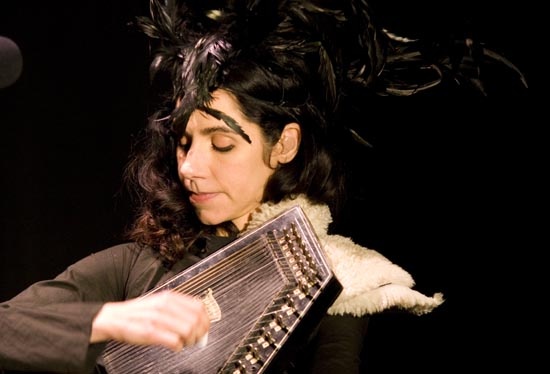Happily a critical consensus is not always wrong, so the contrarian take on PJ Harvey’s perennial success will have to come from elsewhere, certainly not the Albert Hall on Sunday night. There Polly Jean was as great as received wisdom generally considers her to be, or even better, as received wisdom usually has something worthily coercive about it: her performance on the night was involuntary, uncontrived and free.
This isn’t to pretend she’s an immortal, and in fact, she certainly has it in her to occasionally fall short of greatness. Three years ago in Oxford, playing with John Parish promoting A Woman A Man Walked By, she sounded withheld and grounded, the material prohibiting her from emoting like she can when she’s at her most singular and unique, only the demented ‘Pig Will Not’ allowing her to really give it some.
Being in a position to emote through her material is more important for Polly Jean than it is for the kind of singer who has less need of passion to convey what she’s about. Unlike an Annie Lennox or Grace Jones passion is the overt constant and central plank of Polly Jean’s output, without it her forceful delivery would get a little tiring. From Dry onwards, Polly Jean’s voice has functioned as a portal between natural phenomena and the listener, its force expressing passion in such a pure state that it could be said that she is the sound of (human) nature existing for itself, a peek into what emotion and energy are like before we actually get round to humanizing them.
Significantly there has been a gradual switch in her oeuvre from raw femininity and nature in general, to place and climate, and England and the South West in particular. White Chalk was the turning point, where the natural elements of earth, chalk, wood and light were ushered through her voice in place of the productive and personal wounds that had hitherto dominated. Let England Shake goes further, a witchy take on geography and folk history emerging from her shifting trajectory, presenting her as the collector of this island’s secret histories. It is this hybrid, Polly Jean as an all singing rural military historian from Dorset, rather than the tasteful singer songwriter who won the Mercury Prize in an uncrowded field, that is responsible for the unprecedented popularity she now enjoys, twenty years in to her career. Not that there is a hint of national treasure style bullshit here; she hasn’t become music’s answer to Stephen Fry. The atmosphere in the Albert Hall is nearer a Victorian lecture theatre waiting for the unveiling of a new discovery than a trip down memory lane for another media darling.
Rare amongst her contemporaries the audience is actually here for the new album and not a greatest hits set, a distinction she shares with Paul Weller, an unlikely twin documenter of English life. If Let England Shake is a concept album then it succeeds through not telling a literal story, in the way that concept albums since Tommy have tried to, providing instead an atmosphere with references and triggers to the collective unconscious. Gallipoli shares stage time with the Iraq War Resolution and a countryside “weighted down with silent dead”. All this wouldn’t count for much without her voice, the sublimity of which cuts to the heart of whatever matter she’s exploring, anything extraneous shed in its fixed and ungiving wake.
Though Polly Jean has a tendency to hide behind her instruments, when she slips out of their clasp she loses the slightly awkward quality found in a woman playing a harp under a Black Swan Head-dress. Then she shows flashes of the playfulness of one who faced Glastonbury behind a wall of make up in a pink cat suit. As a performer she is always interesting to watch and her on stage energy seems to interest her as much as the audience, as if her talent is something she’s borrowing before whatever mysterious force gave it to her takes it away again. It makes for a direct and powerful performance conducted, paradoxically, with great modesty. The credit for that is not hers alone, the band back her in a solid fatherly way, adding to the Amish religious feel that this music conjures at its more country and soulful moments. ‘Dear Darkness’ practically sounds like a prayer, Polly Jean conducting its source with fear and trembling. Weirdly the other female icon who has strayed into this territory, less successfully, is Madonna who, restricting herself to the pop and gospel traditions, and beginning with less sincerity to start with, left herself with too much to do. Polly Jean is less ambitious and more successful, relying on folk memory and only a little chutzpah for help.
The connections made with her back catalogue square the circle as she approaches the old tunes in a similar spirit to the new, drawing out latent elements by rearranging the context and chronology of her career. ‘Angelene’, one of the most powerful tributes to yearning ever written, is the best of these, though ‘Oh Billy’ and ‘Down by the Water’ sound like they could have been recorded for the new album, the reinterpretation so subtle they sound contemporaneous. A spell-like quality continues to the end, the construction and craft that make it possible hidden in the sea salt, damp and drizzle that are part of the band’s musical affects. Nature feeds and obscures Polly Jean’s craft, the listener recognizing and remaining in thrall to nature because the songs embody it in such a way as to almost hide the singer, almost, as these are her songs after all, and she has been there all along. She finishes as if the evening has been a wonderful surprise to her, smiling guardedly as she goes.
Tariq Goddard’s new novel The Message is out now on Zer0 Books. More information can be found here. PJ Harvey photo by Shot2bits.net



